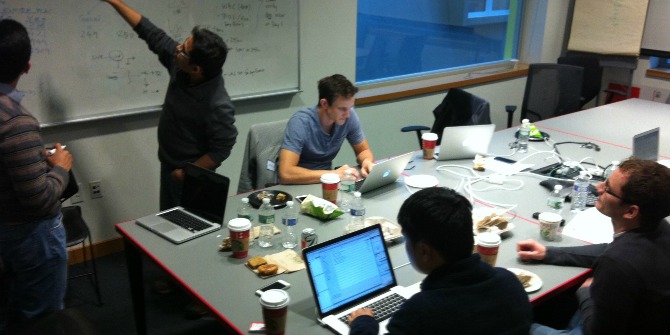 What can academics learn from how civil society organisations and NGOs approach policy impact? Julia Himmrich argues that academics have a lot to gain from embracing the practices of long-term advocacy. Advocacy is about establishing relationships and creating a community of experts both in and outside of government who can give informed input on policies. Being more aware of the political aspects of research can help academics understand and re-evaluate their own arguments about the impact of research.
What can academics learn from how civil society organisations and NGOs approach policy impact? Julia Himmrich argues that academics have a lot to gain from embracing the practices of long-term advocacy. Advocacy is about establishing relationships and creating a community of experts both in and outside of government who can give informed input on policies. Being more aware of the political aspects of research can help academics understand and re-evaluate their own arguments about the impact of research.
This piece is based on an article written for the Dahrendorf Forum at LSE IDEAS.
Whether and how academics should interact with policy makers is a question that has been asked in the International Relations literature for some time. I will leave it to those interested in the academic debate to look at the discussion in the full paper. What I want to argue here is that academics that seek to influence foreign policy should think more politically about their research, build open networks of expert communities and think in terms of a long-term advocacy strategy. Just as important as reaching out to experts and political actors that agree with us, it is crucial to speak to those who we fundamentally disagree with. This is why I argue that we as academics often shy away from talking to those that promote policies we as experts would consider ineffective or counterproductive. By doing that we lose a crucial opportunity for dialogue and influence.
Thinking of promoting one’s research in terms of advocacy is an uncomfortable idea for many academics. After all we are supposed to be scientific and objective. Rather than becoming an activist I argue that academics should aim to become a greater part of the conversation. There are many things to learn from those who do advocacy, and I go into specific detail in the paper. But overall the priority should be for academics to move beyond politicising their research and embrace a more integrated approach to joining the political debate.
Think politically about our research
The first step when considering greater outreach is therefore to reflect more specifically on the political consequences of our research. We undoubtedly spend more time thinking about where to place our research in the academic literature than about the political landscape. In foreign policy, political positions are rarely clear cut along party lines and often specific issues or regions. Here it is also helpful to consider how our research related to contemporary policy making and the priorities of policymakers and civil societies.
Advocacy is not all about campaigning
For some advocacy is equivalent with political campaigns focused on one cause promoted by specialised civil society or interest groups. Instead advocacy is in fact a continuous process of establishing relationships and creating a community of experts both in and outside of government who can give informed input on policies. Those who try to influence foreign policy in civil society have developed networks over time and partnerships with many individuals and institutions. A key aspect of this is to identify and engage allies. In foreign policy these can be Parliamentarians, civil servants in various ministries, or representatives in specific missions. Just as important is the expert community outside of government as civil society, think tanks and academics with a similar expertise. These networks of experts working on a similar issue are likely to be long-term. Academics and experts in civil society may move organization, but they are unlikely to change their area of expertise. Thus when thinking in terms of advocacy it is not about campaigning but instead building a network, which will allow academics to participate in the policy making process in the long term.
 Image credit: Startup Stock Photos Pixabay Public Domain
Image credit: Startup Stock Photos Pixabay Public Domain
Many academics do of course already do this. They advise NGOs, work with government institutions and International Organisations. Many also work closely with policy makers for their research by interviewing them or studying policies. Often however these relationships remain either limited to a project or they are not used to expand a network further. The risk is that when we have achieved greater interaction with policy makers we become gate keepers. This often also results in policy makers, who are more open to academic input, finding themselves becoming the ‘go-to’ policy person for academia. Wider and deeper use of the networks we have created is therefore crucial. This is also essential if we seek to overcome the exclusive nature of both academia and foreign policy circles.
Don’t be reduced to a talking head or to ‘gold dust’
There are several roles for academics in the foreign policy making process and we should think about what role we want to play. Is our priority being an adviser, the expert on empirical data or do we want to steer the debate into a different direction? If we are hoping to become more influential we have to protect ourselves as well from being used as ‘talking heads’ by the media or as ‘gold dust’ for policy papers, which seek academic credentials to support their political point. Being more aware of the political aspect of our research can help us avoid being reduced to sound bites or footnotes.
Step out of the ‘political comfort zone’
Beginning to think politically about our research and reaching out to the relevant experts outside of academia is only the first step. Stepping out of the political comfort zone is however just as important. The study by the UK Parliamentary Office of Science and Technology (POST), discussed in a different LSE blog post, found that Caroline Lucas, the only Green Party MP in the UK, was the MP most referred to by academics. While Lucas is the winner of several prizes for her parliamentary work and engagement with civil society, it does appear that academics may have stopped after the first step of seeking allies. As academics, unlike some civil society groups, we are in a strong position of reaching ‘across the aisle’. But surprisingly we often don’t choose to do so. Instead we like to collaborate with those who agree with us politically. Academics do have a chance to break through deadlock of political debates. The engagement with those we may disagree fundamentally may be daunting, but we shouldn’t shy away from difficult conversation. Choosing dialogue and asking difficult questions will also force ourselves to understand the other side better and maybe re-evaluate and strengthen our ability make our argument and influence policy.
Note: This article gives the views of the author, and not the position of the LSE Impact blog, nor of the London School of Economics. Please review our Comments Policy if you have any concerns on posting a comment below.
Julia Himmrich is a Research Associate at the Dahrendorf Forum, a joint initiative by the Hertie School of Governance, LSE and Stiftung Mercator, and PhD candidate in the International Relations department at LSE. @juliahimmrich








Just to say the link to the other blogpost has some errors. It should be https://blogs.lse.ac.uk/impactofsocialsciences/2015/10/19/the-impact-of-uk-academia-on-parliament/
Thanks Henry! Fixed now.
-Sierra
A great post, Julia, and well-articulated! I quite agree with your views on the need for thinking about long-term advocacy. What this make me think about is exactly how this kind of thought can be encouraged or fostered early on in the research career. Most early-career researchers or even the mid-career academics are likely shy or nervous about thinking beyond their work. Perhaps the more experienced academics would feel more confident about thinking beyond their research and engaging in external dialogue. I believe it is the younger (in terms of experience) academics who struggle with building that sort of perspective about the potential of their work. If each researcher realized that what he or she were doing had the potential to influence change at a policy making level that would be brilliant. In fact, I would think that such a realization would fire me up to actively seek out influencers outside academia. So the point is, how could academics be encouraged to stepping out of their political comfort zone and reaching across the aisle, when their most critical concerns are revolving securing that next grant, applying for that postdoc, finding a career after research, or publishing that next paper?